McAfee's Mangled Museum Metaphors
The company's Science Museum exhibit is trying to explain some important security issues using two big screens - each maybe 8ft wide and with a built in camera. So, anyone who walks in front of a screen appears on it.
One screen is intend to convey the idea that we are beset by computer bugs. People appearing on screen are shown with a whole lot of computer-generated insects swarming around them. They can dispel the critters by waving their arms or shaking their heads. That's not something that's ever got rid of bugs on any PC I've worked on - though I usually do both out of sheer frustration.
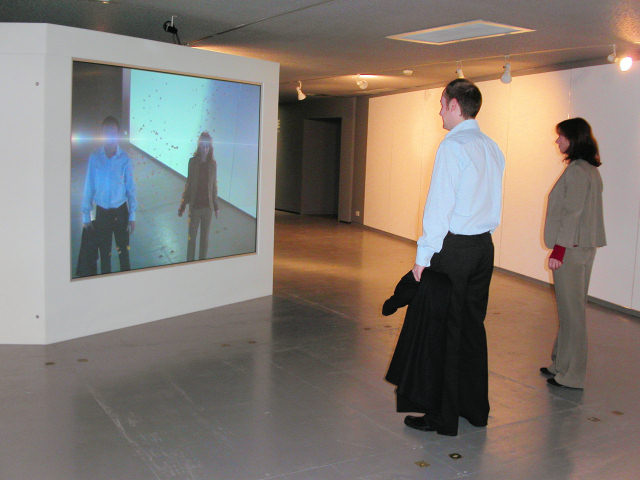 McAfee Digital You "bugs"
screen - note the lack of
McAfee Digital You "bugs"
screen - note the lack of information around the screen and on the right wall
The other screen is intended to convey the idea of identity theft and requires two people to stand in front of it, whereupon their heads get swapped around.
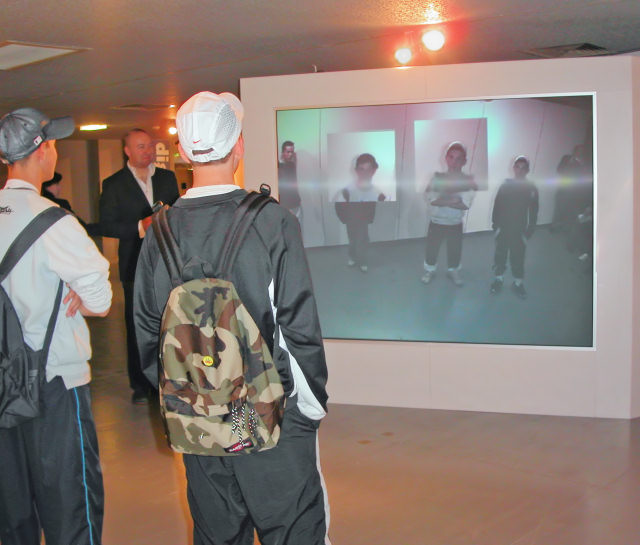 McAfee Digital You "identity-theft" screen. A group of French
teenagers somehow
McAfee Digital You "identity-theft" screen. A group of French
teenagers somehow got into the exhibit during the press briefing but lost interest soon after
Neither is necessarily a bad way of gaining attention but, sadly, there is no supporting information around the screens, or near them. There's also no audio (how hard to believe, is that?); and not even a URL or email address for further info – though it's hard to imagine anyone being sufficiently inspired to want to know anything more.
The only information available is a mess of hard-to-read words and phrases covering a large part of a dimly-lit wall to the left of the "bugs" screen - but some distance from it. Call me negative if you will, but I would be astonished if anyone – whether child or adult – were significantly wiser after interacting with the screens and trying to read the wall of words. I'd be delighted to be proven wrong, really I would, but deeply shocked all the same.
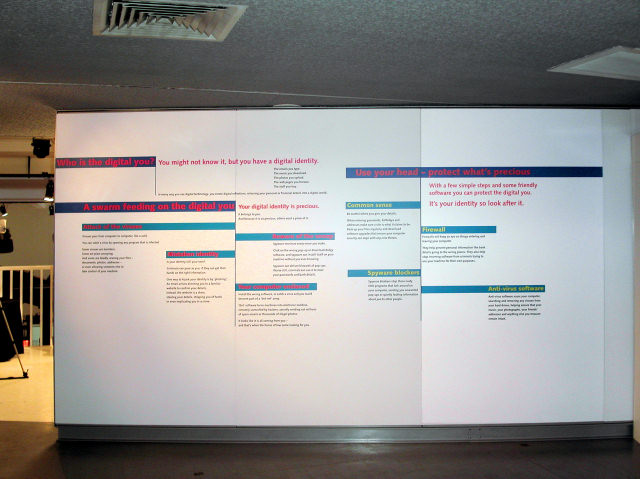 The dimly-lit word wall.
Click for a large image and you
The dimly-lit word wall.
Click for a large image and you should be able to read how uninsipiring the information at Digital You really is.
And this is a WYSIWYG wall; there is nothing more to read
On the plus side - from McAfee's viewpoint, anyway - the company's exhibit, called "Digital You", is reasonably well situated. Okay, it's up a flight of stairs but it's close to the South entrance. Even if visitors don't immediately go up to the Digital You balcony – The Bridge, is the museum's name for the area - most will go past it. Trouble is, the signage on the balcony can't be seen well by people walking past on the floors below and, if it could, there's really nothing on it to inspire anyone to check out what's up the stairs.
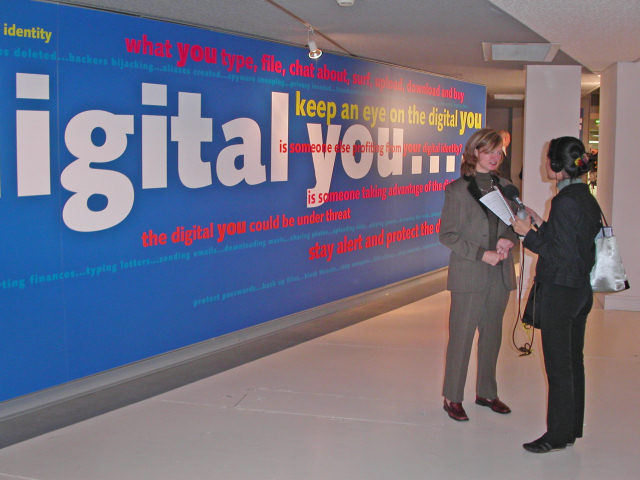
McAfee's Digital You walk-through
is behind
the big sign on the balcony
 From floor below, the big
sign on McAfee's balcony is hard to spot - and nearly impossible to
read
From floor below, the big
sign on McAfee's balcony is hard to spot - and nearly impossible to
read (and would be even if the cloth-covered table were removed). But, close up, as you can see
from the image above this one, the big sign says next to nothing, so that's alright, really
Dome deja vu
The whole thing reminded me all too vividly (if drab can indeed inspire vivid) of the numerous inadequate and boring displays that took a cold, wet flannel to visitors' sensibilities within the Millennium dome.
Mind you, some of the dome exhibits did at least get across a corporate message of a kind, though that, of course, was part of the reason why they were so irritating and inappropriate. But McAfee's little walk-through area will, I think, do little to boost the company's public profile (it seems that museum guidelines ensure that is the case), and next to nothing to inform or inspire visitors - though the screens just might give half a minute's light relief to the very young or the hard-of-thinking.
And, even ignoring the money and effort that's been wasted, that's a damn shame. The public does need a lot of educating about computer viruses, Trojans, spam email, phishing, identity theft, internet fraud generally, and all the other nasties that our ISPs are capable of delivering into our homes, and about the things that can be removed from them.
Even so, there certainly will be a few people who do get something out of McAfee's Digital You exhibit. For a start, there are firms getting truckloads of money for implementing or coming up with the company's misbegotten ideas – and for aiding in the design and hiring out the kit that's used over the two months.
Of course, further confirming that some clouds really do have high-carat silver linings, the Science Museum is also probably receiving a substantial and much-needed boost to its low-flowing coffers.
But were I a mover-and-shaker at McAfee – or indeed the Science Museum – I'd take the view that Digital You, as it stands, doesn't stack up and that a whole lot of arse kicking is in order, and hard. No one, it would appear, has had the bottle to point out that this particular emperor is stark-digital naked.
Oh, and if you think that a piece like this gets written with any degree of pleasure or without a great deal of consideration, you'd be wrong – though as a cynic myself, I'd have considerable sympathy with your viewpoint.
The private press showing of Digital You was held yesterday morning (Tuesday, September 8), and I returned early that afternoon having been told that the public would by then be allowed in.
Well, that was wrong – the stairs were still cordoned off – and that came as a bit of a relief. Deep down, I was hoping that someone at McAfee had already seen the light and the company will keep the barriers in place until it's reworked the exhibit so that it conveys some useful information. But I'm not holding my breath, having many times over the years (plenty of them recently) been astonished at the sheer lack of common sense shown by so many companies.
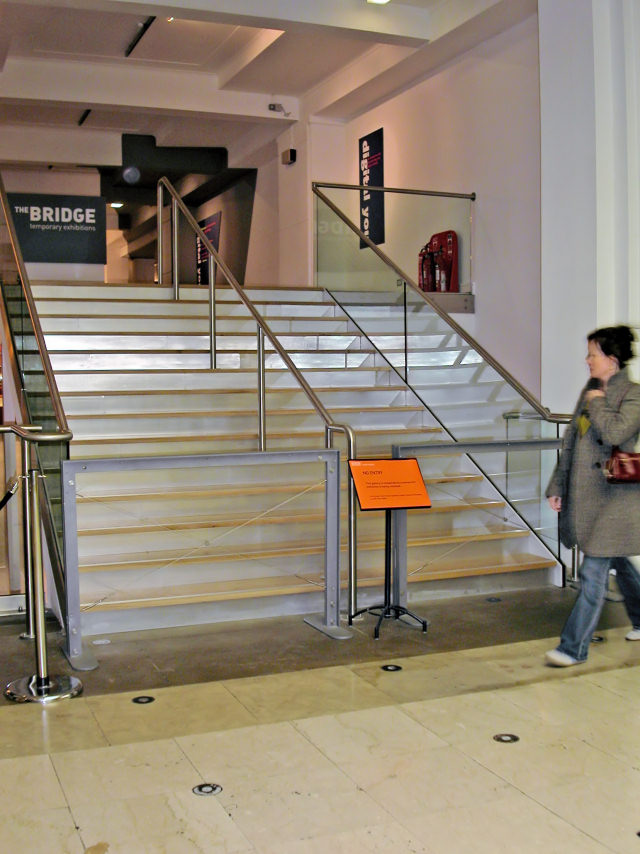
Even from the bottom of the
stairs, there's nothing to draw you in. After the
press event, McAfee kept the area closed - hopefully to try to sort out some of its shortcoming
press event, McAfee kept the area closed - hopefully to try to sort out some of its shortcoming
So what, you may ask, is the answer to the serious problems of computer security? Well, if I thought I had one, you can be sure I'd tell you. Right now, other than legislation, I don't know what to suggest. But, since I don't trust the legislators on this or the other side of the Atlantic, I'm not actually going to suggest that.
What I would like to do, though, is hear your ideas and debate them with you, so come and have your say over in the HEXUS. community.
* Editor's note - yes, we know that the screens aren't, strictly speaking, metaphors but we just couldn't resist that headline (or, indeed, stop ourselves using it repeatedly).






